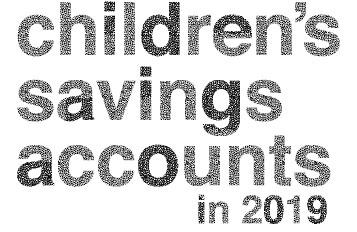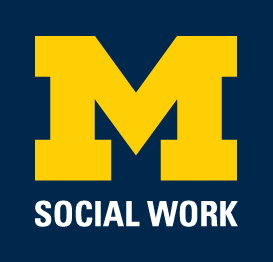Children’s Savings Accounts in 2019

Children’s Savings Accounts (CSAs) programs are interventions that seek to build assets for children to use as long-term investments. They have the potential to act as the plumbing for an asset building agenda that helps low-income children thrive, linking poor children with accounts and creating the space for receipt of both private and public wealth-building transfers.
Watch the CSA 2019 conference videos »
Time & Location
May 8-10, 2019
Atrium of the University of Michigan’s School of Social Work
1080 South University Avenue
Ann Arbor, MI 48109-1106
Agenda
Pre-Conference – Starting a CSA (Wednesday - May 8, 2019)
|
Start Time
|
End Time |
Event
|
Speakers
|
|
|
12:00 |
12:10 |
Welcome/Introduction |
Willie Elliott (AEDI) |
|
|
12:10 |
12:45 |
Lunch and opening speech by Andrea Levere |
||
|
12:50 |
2:30 |
Starting a CSAThis panel will discuss how to start a Children’s Savings Accounts (CSAs) program. CSAs are financial vehicles that seek to build wealth for children, typically starting as early as birth or kindergarten. There are currently 54 CSA programs serving some 382,000 children in 32 states. Not yet included in these figures is Pennsylvania; this year, the state adopted bipartisan legislation to provide each of the approximately 140,000 children born annually in the state a CSA with a $100 scholarship grant, starting in 2019. While there are so many new and great CSA programs around the country, we have selected a few of the most well-known to tell us a little bit about how they started their CSA program and to answer your questions about stating a CSA. |
||
Panel
ModeratorTeresa Gillotti (Washtenaw County Office of Community and Economic Development) |
||||
|
2:30 |
2:40 |
Break |
||
|
2:40 |
4:00 |
Financial PartnersThe accounts that form the core intervention within CSA initiatives are delivered through two principal delivery systems: traditional depository institutions (banks and credit unions) and state-sponsored 529 college saving plans. The objective of this session is to provide information to organizations seeking to start a CSA about the different delivery system options. The panel of experts will provide information on the different delivery systems and participate in a discussion with the audience about potential financial partners for their programs. |
||
Panel
ModeratorDiane Brewer (Michigan Education Savings Program) |
||||
|
4:00 |
4:15 |
Break |
||
|
4:15 |
5:45 |
Funding CSAsPolicymakers and programs need to determine the funding for their CSA programs, as the use of State General Funds, revenue from 529 fees, philanthropic dollars, city parking fees, or some combination will likely determine the level, distribution, and sustainability of CSA financing. In this session the panel will discuss possibilities for funding a CSA program and take questions from the audience. |
||
Panel
ModeratorFrank DeGiovanni (Ford) |
||||
|
6:00 |
7:30 |
Recognition Dinner (Award: Andrea Levere) |
||
Day 1 (Thursday - May 9, 2019)
|
Start Time |
End Time |
Event |
Speakers |
|
|
8:00 |
9:00 |
Networking Breakfast |
||
|
9:00 |
9:05 |
Welcome |
Willie Elliott (AEDI) |
|
|
9:05 |
9:15 |
Introduction |
Lynn Videka (Dean, University of Michigan School of Social Work) |
|
|
9:15 |
9:45 |
Opening Address |
Michael Sherraden (CSD) |
|
|
9:45 |
10:00 |
Break |
||
|
10:00 |
11:30 |
State of the FieldVibrant interventions thrive on diversity and inclusion, as different perspectives pull in new stakeholders and new ideas are incorporated into the growing knowledge base. Successful policy development requires clarity of vision and unity of purpose, articulation of which positions novel ideas as compelling, relevant, and actionable. The field of Children’s Savings Accounts is at a crossroads today. Proliferation of demonstration programs, passage of policies at the local and state levels, and greater awareness among elites and the American public have made it possible for CSAs to evolve from a movement grounded in innovative scholarship and propelled by dedicated practitioners, to a coherent policy approach ready for implementation. This panel of experts will start the conversation off about what are the greatest challenges facing the CSA field, what areas hold the most promise, and where it is going. |
||
Panel
ModeratorGina Chowa (University of North Carolina) |
||||
|
11:30 |
12:15 |
Reflecting and Networking Lunch |
||
|
12:15 |
2:00 |
Policy Landscape – Putting the Plumbing in PlaceIn addition to cultivating educational expectations and establishing an asset-based financial aid strategy, Children’s Savings Accounts also have the potential to widen and deepen financial inclusion. From this perspective, CSAs can facilitate financial inclusion by bringing otherwise marginalized households into the financial mainstream, providing knowledge and opportunities for successful interactions with financial institutions, and creating a foundation for financial security. Highlighting financial inclusion as an outcome of CSAs is not just about bringing financial institution partners along; it is also crucial to reshaping Americans’ understanding of and expectations about what CSAs can do. Here, panelists will share research and practice wisdom regarding CSA design and delivery to optimize financial inclusion from varying levels of scale, including individual CSA programs to national CSA policy. Resources |
||
Panel
ModeratorKris Perry (California Governor’s Office) |
||||
|
2:00 |
2:15 |
Break |
||
|
2:15 |
3:45 |
Asset Accumulation – Turning On the WaterChildren’s Savings Accounts (CSAs) programs are interventions that seek to build assets for children to use as long-term investments. They have the potential to act as the plumbing for an asset building agenda that helps low-income children thrive, linking poor children with accounts and creating the space for receipt of both private and public wealth-building transfers. This means rethinking CSAs not just as vehicles for household savings, but also as an institutional structure for asset transfers, consistent with American values. However, what might be termed small-dollar CSAs (i.e., initial deposits between $5 and $1,000) is a starting point not an end. Water, in the form of a wealth transfer, will have to be pumped into these accounts. This panel will discuss different ways to pump water into CSAs that go beyond individual saving. |
||
Panel
ModeratorTerri Friedline (AEDI) |
||||
|
3:45 |
4:00 |
Wrap Up |
Willie Elliott (CSD) |
|
|
6:00 |
7:30 |
Reflecting and Networking Dinner |
||
Day 2 (Friday - May 10, 2019)
|
Start Time |
End Time |
Event |
Speaker |
|
|
8:00 |
9:00 |
Networking Breakfast |
||
|
9:00 |
10:45 |
New Research FindingsCSAs are more than just an appealing idea or a feel-good investment in children. They are supported by an increasingly robust evidence base that pulls from a variety of studies, conducted by different researchers, examining programs with different designs, and utilizing different methods to ask distinct as well as validating questions. Here, leading scholars speak to findings from new studies they have conducted, the aggregate knowledge base supporting CSAs, and the next frontiers to be examined in analysis of CSAs and their outcomes. The panelist are asked to go beyond their findings to grapple with implications for the field. |
||
Panel
ModeratorMarc Hernandez (NORC – Oakland Promise) |
||||
|
10:45 |
11:00 |
Break |
||
|
11:00 |
12:30 |
Research Design & MeasurementBecause CSA programs “often” start at birth or when a child enters kindergarten and aim to increase college attainment as a primary long-term goal (i.e., a long- term outcome metric), it is critical to identify interim outcomes that have been shown to be strong predictors of children’s enrollment in college (i.e., short-term outcome metrics), with the understanding that some of these same factors, as well as others related to institutional performance and student characteristics, may influence persistence to achievement of a college degree. One of the crucial challenges facing the CSA field, then, is the articulation of valid, observable, accessible interim measures, by which CSA programs and those watching them can assess the extent to which the intervention is ‘on track’ to achieve its stated aims. Another crucial challenge is improving on the research designs being used to study CSA programs. This discussion will cover two of the most rigorous research studies in the field, discuss efforts to develop common metrics that can be used across the field, and present a new instrument for studying the college-saver identity among kindergarten through third grade children. |
||
Panel
|
Research Design |
|||
|
Measurement |
|||
ModeratorDavid Sieminski (CFPB) |
||||
|
12:30 |
1:30 |
Lunch |
||
|
1:30 |
3:00 |
State of Practice |
||
Panel
ModeratorPatrick Hain (National League of Cities) |
||||
|
3:00 |
3:15 |
Concluding Remarks |
||
 Facebook
Facebook Twitter
Twitter
